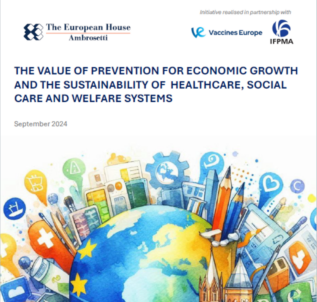Statement on influenza vaccine supply in the 2019-20 Northern Hemisphere season
The WHO’s recommendations for the viruses (4 and 3 strains) to be included in influenza vaccines each season provide critical guidance to national public health authorities, regulatory agencies and vaccine manufacturers in advance of development and production.
On 21 February 2019, WHO announced the recommended virus strains to be included in influenza vaccines for the 2019-2020 Northern Hemisphere season. Three strains were recommended, however, the announcement of the fourth strain (A/H3N2 type) was deferred for 4 weeks to March 21st. Such a delay, whilst not unprecedented, was unexpected, however manufacturers are supportive of WHO’s efforts to ensure that the best matched candidate vaccine viruses are available for each influenza season.
Following the WHO’s recommendations, it takes approximately 6-8 months to produce and approve the full global supply of influenza vaccines following the receipt of the recommended candidate vaccine viruses. Any delay in the process, such as has occurred in this case, will likely cause a subsequent delay to market supply.
Additionally, if the A/H3N2 candidate vaccine virus which is eventually recommended by the WHO delivers poor manufacturing yields, and no alternative candidate is available, there is the potential for further delay to vaccine supply, significantly shortening the immunization campaign for the upcoming season.
Given the potential for significant delay and the associated threat to public health, manufacturers request that the WHO, national public health agencies and regulators plan for this scenario while continuing for the timely and sustainable supply of the vaccine for the 2019-2020 influenza season.
We believe postponement of the WHO announcement does not change the importance of annual seasonal influenza campaigns nor of the seasonal influenza vaccination coverage goals to be achieved. So as to maintain public confidence in national influenza programs, manufacturers additionally ask the WHO and countries to coordinate with Manufacturers in publicizing the reasons for the delay, namely the desire to provide the best matched vaccine for the coming season. We also request that WHO and countries plan for extending the immunization season, if this should be required, to maximize vaccination coverage and minimize the impact of any potential delay.
The biopharmaceutical industry affirms its continued commitment and collaboration in ensuring the success of seasonal influenza vaccination programs and as a longstanding public health partner in the field.
About IFPMA
IFPMA represents the innovative pharmaceutical industry at the international level, engaging in official relations with the United Nations and multilateral organizations. Our vision is to ensure that scientific progress translates into the next generation of medicines and vaccines that deliver a healthier future for people everywhere.
ifpma.org
To achieve this, we act as a trusted partner, bringing our members' expertise to champion pharmaceutical innovation, drive policy that supports the research, development, and delivery of health technologies, and create sustainable solutions that advance global health.




